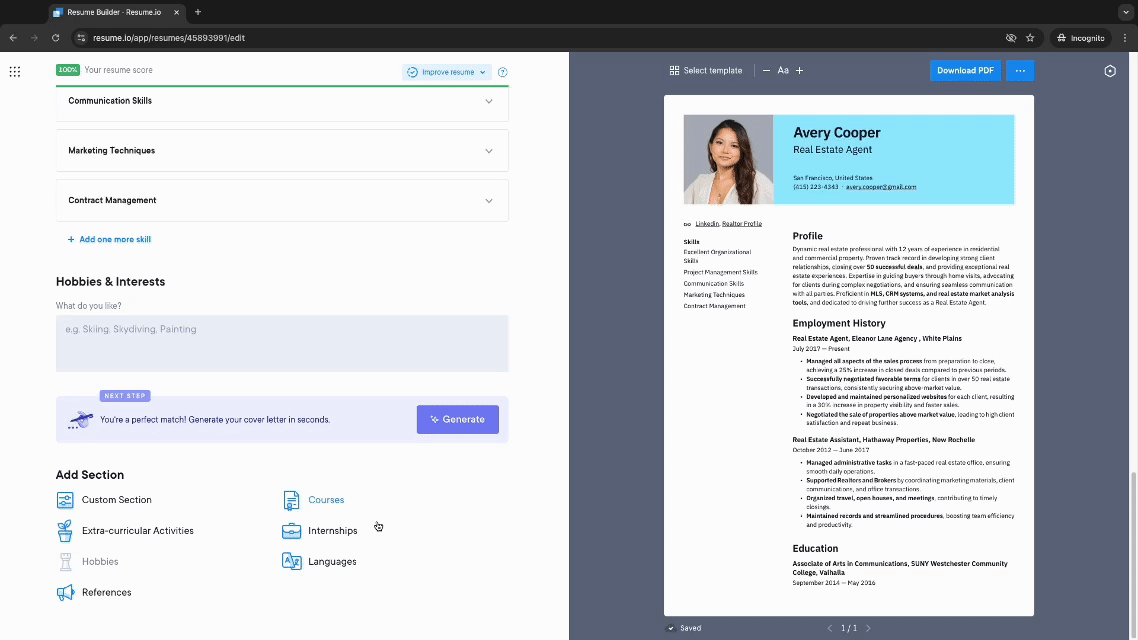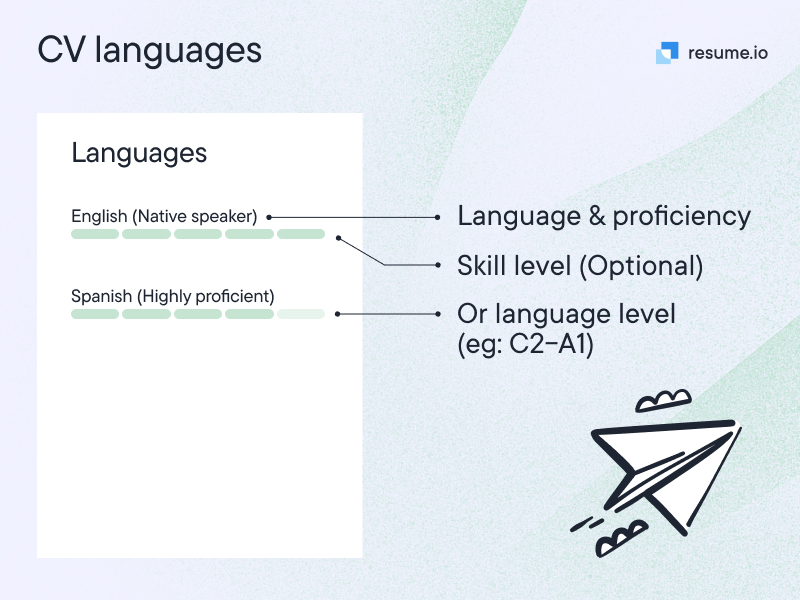Nearly 50% of the world’s population speaks more than one language, and if you’re part of that group you’ve likely wondered how and when to include language levels and abilities on your CV. As the world becomes more and more connected, there’s never been a better time to familiarise yourself with best practices for listing languages on your CV.
When to list languages on your CV
Put simply, it almost always makes sense to include language skills on your CV — as long as you are proficient in the language.
If a job advert notes a language requirement, be sure it’s reflected on your CV. Depending on the extent of your language skills, you might consider including your fluency in a CV section for special skills or, if you speak numerous relevant languages, in a language section.
Even if the advert does not require fluency in other languages, you can still include any fluent languages on your CV. Jobs working with customers, clients, or global offices can all benefit from multilingual employees.
According to the Association of Translation Companies, multilingual employees are very much in demand across the U.K.
Between June and July 2022, one report notes that 619 jobs posted in the UK required a second language.
The most commonly requested language was German, followed by French, Spanish, and Italian.
How to assess your language levels and skills
Perhaps you studied German in university or took a few courses during your secondary education — should you add it to your CV? What if you grew up speaking Italian at home, but never studied it formally?
Luckily, there is a way to assess and state your level of language proficiency on your CV. The UK uses a scale called the Common European Framework of Reference for Languages (CEFR) to describe levels of language fluency.
A: Basic user (beginner)
This level includes A1 and A2. Someone at the A1 level (“Breakthrough”) is just learning a language, likely able to understand or use common expressions or basic phrases (introducing themselves, asking simple questions).
At the A2 level, known as “Waystage,” someone can communicate a bit more, speak more descriptively, and exchange more information.
Both of these designations put someone at the beginner level, meaning they likely lack enough proficiency yet to use the language in a professional setting.
B: Independent user (intermediate)
Level B is made up of B1, Threshold, and B2, Vantage. At this level, individuals can understand and discuss regular daily matters, could likely do well handling any standard travel situations, can share opinions and plans, and produce written information.
At the higher end of the scale, B2, this also means an individual can communicate well with native speakers with limited confusion or frustration by either party.
C: Proficient user (competent)
Level C is the highest on the scale. C1, Advanced, means that someone can speak, read, and write the language at a quite fluent level.
At C2, an individual reaches Mastery. That means you can speak and understand with ease, translate between languages, and handle even complex language situations and communications.
Officially, C2 does not equal full native or bilingual fluency.
What language levels should I include on my CV?
Certainly, if you’re level C1 or C2, or you have native fluency, you should add this language to your CV.
In some cases, it may be helpful to include B2 fluency — for example, if you believe you could quickly jump into the role and make immediate use of your language skills, even if you’ve not 100% mastered the language.
Unfortunately, if your skills are below the intermediate level, including them likely won’t add much to your CV. If you’d like to include them anyway, remember to do so transparently and make clear your true proficiency level. And keep learning and building that proficiency.
How should you describe your language skills?
Rather than just relying on CEFR levels (which may not be familiar to every hiring manager or recruiter) you can use terms like “fluent,” “native,” or “full professional fluency” to describe your ability to use a language. Always be honest about your true competency when adding languages to your CV.
How to list language proficiency levels on your CV

Once you’re clear on the way to describe your language skills, there are numerous ways to consider displaying them on your CV— especially if you’re using a CV creator that helps you structure each section effectively.
1. Language section
If you speak more than two languages proficiently, you might consider a specific language section on your CV. This lets you call attention to your language abilities, making it obvious to the hiring manager.
When you’re applying for a role in an English-speaking country and using a CV that’s written in English, there’s no need to list English as a language skill.
Take a look at the following example:
- Portuguese: Native fluency
- Spanish: Fluent (CEFR level C2)
- German: Advanced (CEFR level C1)

2. Within your work experience
If you’ve used your language skills in your past positions, document that under each role. You can include bullet points to explain the language you used and how you used it.
Especially if fluency in this language is part of a job’s required skills, make sure it’s reflected in your professional experience. It’s ideal to clarify exactly how your language skills benefited the company, whether you increased revenue, led teams, or trained colleagues.
Product Manager, Super Solutions
January 2014 - January 2018
- Managed online and in-person correspondence with clients in France, acting as office point-person for French translation and negotiations.
3. In your education section
If you studied a language as part of your formal education, you can note that in your CV’s education section — especially if you completed an entire course in the subject.
It may not benefit you to include this if you’ve only taken a single class in a language; your CV should reflect the skills you’ll bring to a company now, not a language you briefly studied and never used. Use your CV to display your proficient languages, not just those you dabbled in.
Do consider adding any relevant societies, groups, volunteering, or studies abroad that allowed you to use these language skills.
Bachelor of Arts, Spanish Language and Culture, University of Edinburgh
- Leader of Spanish Society; Studied abroad in Argentina
4. In a special skills section or summary
You can weave your language training and experience into a skills list on your CV. This is ideal when the language isn’t the main focus or a requirement of the job but you still want to include it.
Make it even more compelling by including additional detail and evidence of using the language.
For example:
Native Spanish speaker with four years volunteering at local Spanish community organisation
Alternatively, you can note your language fluency in a summary section at the top of your CV. Use the section to describe yourself as a bilingual or multilingual professional with fluency in a certain language or languages.
Reminder
Remember to be as clear as possible about your true proficiency in the language. Expect that an employer may ask to assess your language skills during the interview, and set yourself up for success by being honest.
Depending on the company and position, you may also be required to undergo a written language exam. While an organisation might consider someone whose proficiency is a little lower than ideal, they likely won’t consider a candidate who misrepresented their abilities.
If you have strong language skills, chances are you may someday be interested in working from a different country, particularly one that uses a language you’ve learned. How should you create a CV for such an opportunity?
Creating a CV certainly has similarities across countries and cultures, but there are a lot of differences, too. If you’re hoping to learn more about creating an international CV, we’ve got you covered with our Europass CV guide.
CV language levels: what businesses want
As we’ve shared, knowing multiple languages can set you up as a top candidate for various roles and increase your career options. If you’re not already fluent in multiple languages, or are looking to add to your repertoire, here are some of the most in-demand languages by businesses in the UK.
Per the University of Sunderland, some of the top languages include:
- German
- Spanish
- Japanese
- Mandarin
Additional high-impact languages in the UK include:
- Arabic
- Dutch
- French
- Russian
Of course, the world is always changing and what’s in demand today may be less so tomorrow, so it’s important to stay up to date.
Should you list your conversational language skills if unrelated to the job?
If your basic level of language proficiency truly has no relation to the job that you would be performing, it won’t be especially valuable. It may, however, highlight your ability to learn and an openness to engaging with other cultures.
Key Takeaways
- Being able to communicate in multiple languages is an important skill in today’s global marketplace. Therefore, it’s useful to include it on your CV to make yourself a competitive candidate.
- Use the Common European Framework of Reference for Languages (CEFR) to assess and describe your level of fluency in a language.
- Include language levels on your CV in a special language section, your work experience or education section, or a skills section.
- Focus on languages that are in demand or those in which you’re highly fluent.




